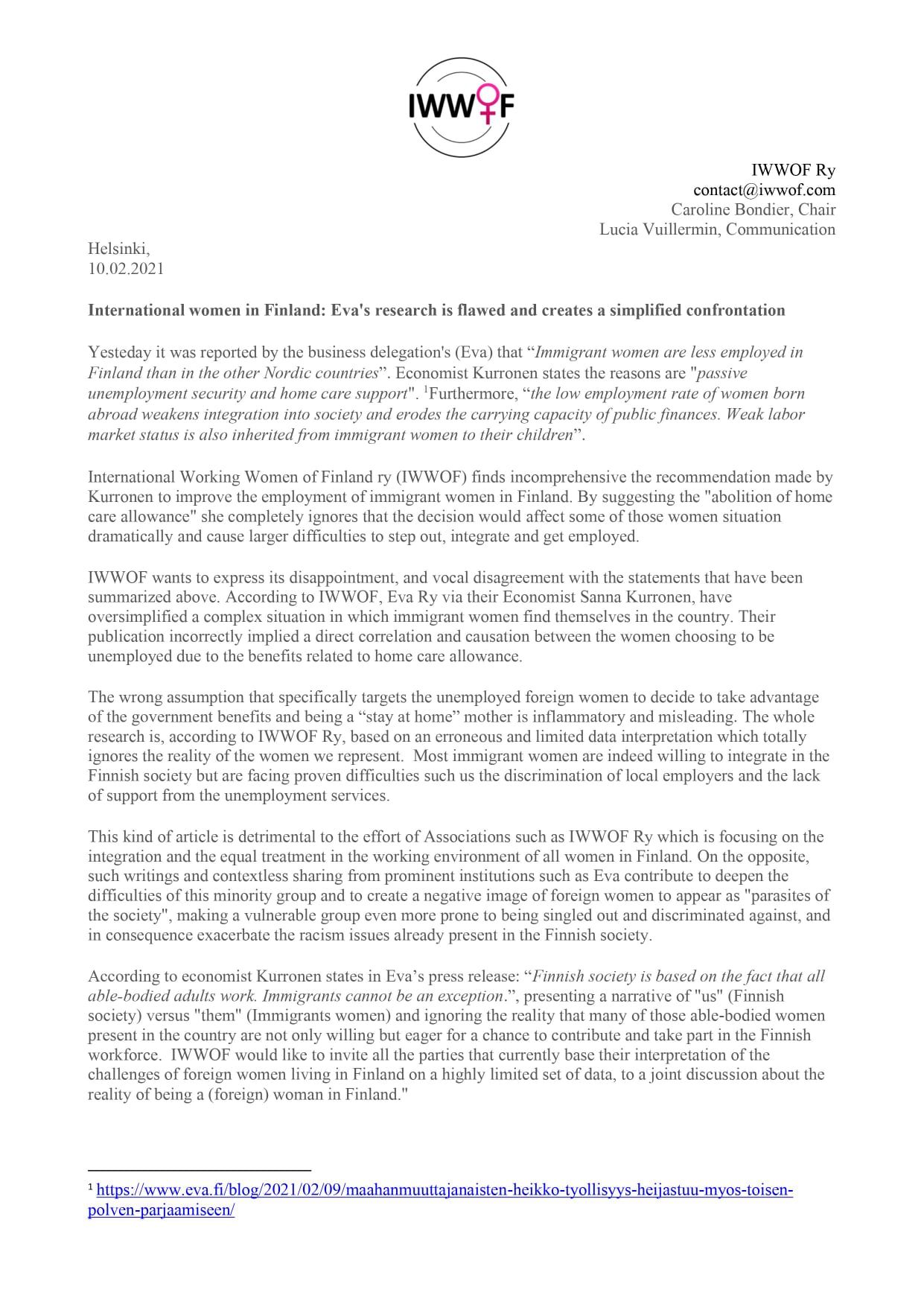"Brain waste" of foreigners in Finland, and a flawed research report about immigrant women's unemployment situation
It's unbelievable how things can change within 24 hours...
We were so happy to see the fantastic article by YLE about "Brain waste" of foreigners and returning Finns due to bias recruitment, discrimination, dismissing foreign degrees and years of working experience gained abroad, that was published yesterday.
"Brain waste" is described by migration policy-makers as a situation when "credentials are not recognised, people don't do the jobs they could, and everyone loses out: destination countries, employers and immigrants themselves”.
This article managed to do the almost impossible; it described foreigners' struggle whilst showing them respect and support, not even speaking about the importance of being seen and heard by the Finnish policymakers.
"It is unfortunate for both the individual and society as a whole, whenever skilled peoples' abilities are not utilised. For foreign jobseekers, their employment opportunities are often unfortunately affected by discrimination at recruitment level," says Employment Minister Tuula Haatainen.
However, a few hours later, we, immigrant women got slapped right back by a newly published research by Eva.fi that describes themselves as - "Finnish Business and Policy Forum EVA, Aiming to promote the long-term success of the Finnish society".
Read the articles about the research in Finnish and in English or the whole research report in Finnish here.
Economist Sanna Kurronen wrote in the Eva report, that "passive income (unemployment benefit or home care allowance) seem to be the reason for the unemployment of immigrant women".
This is such a wrongly worded conclusion that does not at all consider the biases we, immigrant women, face during the job search. In addition to that, we cannot forget about the well-known fact by all of us foreigners living in Finland, that if your work experience and education do not relate to tech industry, your chances of finding a job are significantly lower than any other person's with this "superpower".
We take this research personally since, we both were once in the situation of looking for a job for months, doing all that everybody recommended like volunteering, networking, and still were in the position of unemployed women. It is also important to mention, that we were not entitled to the unemployment benefit, and we had to support ourselves from our savings. Our situation was the reason for starting this podcast. Finnish companies and educational institutions were not interested in women with a master's degree and years of practice, and we had to make it work somehow for ourselves. Let's not forget to mention that all the international women we have ever met in Finland wanted no more than to find a job. However, due to the previous article's issues, many of them could not do so.
Kurronen also adds that "Finnish society is based on the fact that all able-bodied adults work. Immigrants cannot be an exception,”.
Again, we want to work, but we often don't get the chance to do so!
The report also states that a possible solution to the problem of low employment of immigrant women would be to abolish the home-care allowance. This so-called "solution" would only worsen the position of immigrant mothers in Finnish society. You can read more about this in the International Working Women of Finland statement, a community for international women in Finland. They published an official response reacting to the Eva research. Big thanks to them for issuing this document and please read what they have to say below:

Sanna Kurronen replied to this statement on the LinkedIn profile of the International Working Women of Finland and here is the copy:
"Thank you for the comments.
Under no circumstances was the purpose of the writing to fuel confrontation, but to highlight how the Finnish system fails to employ immigrant women. It is only the system that is to blame, not the immigrants.
It is true that there is no contingent evidence of the harmfulness of home care allowance. However, it is such a likely disadvantage to women's employment that the OECD has recommended considering removing it in this report: https://www.oecd.org/publications/working-together-skills-and-labour-market-integration-of-immigrants-and-their-children-in-finland-9789264305250-en.htm .
There are many challenges in the Finnish labour market, mainly affecting the entire population. Home care allowance also undermines the employment and earnings of women in the ordinary population. Poor employment services are a problem, especially for those who are not yet attached to the labour market. In addition, immigrants face discrimination and there is probably room for improvement in integration.
However, it is important to note that the problems are not caused by someone looking for work, but by the system and it is up to politics to fix them. The aim of the writing was to awaken decision-makers to these problems."
Finally, Yle published a reaction article to the previously mentioned report with Chiara Costa, an expert helping immigrant women to find work in Finland. This article underlines the importance of creating suitable solutions to the low employment rate of foreign women and not simply stopping the home-care allowance income.
According to Costa "The biggest problem is that immigrant women do not have networks to find work. More than eighty percent of jobs are hidden jobs, they are nowhere to be seen."
And finally, she states the importance of seeing immigrant women in Finland as a diverse group with a variety of backgrounds, rather than a cohesive group.
This is such an important statement since as everybody else, we are different individuals. We come from various places, we don't have the same education, the same age, the same networks, and the same knowledge of Finnish or English.